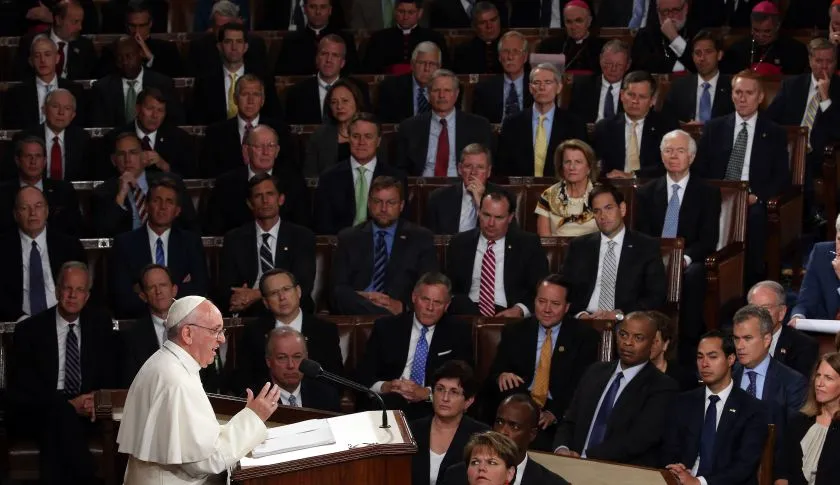
Pope Gets Standing Ovation for the Golden Rule
Pope Francis’ speech to the U.S. Congress this morning felt like a State of the Union address with the incessant punctuation of standing ovations.
One seemed peculiar. The Golden Rule drew thunderous applause before the Holy Father could even invoke it. Maybe it was the context. He was imploring American lawmakers to follow the Rule in dealing with immigration and the refugee crisis that has enveloped the world. To quote, “We must not be taken aback by their numbers, but rather view them as persons, seeing their faces and listening to their stories, trying to respond as best we can to their situation. To respond in a way which is always humane, just and fraternal. We need to avoid a common temptation nowadays: to discard whatever proves troublesome. Let us remember the Golden Rule: Do unto others as you would have them do unto you.”
The Golden Rule is often attributed to Jesus of Nazareth who used it in his summary of the Torah: “Do to others what you want them to do to you. This is the meaning of the law of Moses and the teaching of the prophets” (Matthew 7:12 NCV or Luke 6:31).
But the ethic of reciprocity we now call the Golden Rule has roots in many ancient cultures and is a standard used by different civilizations to resolve conflict. Many prominent religious figures and philosophers have restated it in various forms. In other words, Jesus wasn’t the first to suggest we have the same regard for others that we do for ourself; that altruism should trump egoism. Which leads me to last night.
I spoke to a local church group of my journey from faith. In the Q and A session, one dear soul asked how Christianity would fare if everyone shared my skepticism. I was not optimistic. Her supplementary query was how young people would get their morals if the church disappeared. I was quite optimistic here, suggesting as kindly as I could, that there is a godless ethic, that morality need not be religiously based.
British philosopher A.C. Grayling, for instance, has compiled a secular version of the Ten Commandments in his parallel bible called The Good Book. While Pope Francis would not likely vote for them to replace the divine edicts given to Moses, he might promote them as much as he promoted the Golden Rule this morning. I leave you with Grayling’s secular Ten Commandments and a reminder that if you don’t know right from wrong then what you lack is not religion but compassion.
Love well.
Seek the good in all things.
Harm no others.
Think for yourself.
Take responsibility.
Respect nature.
Do your utmost.
Be informed.
Be kind.
Be courageous.
Post a comment